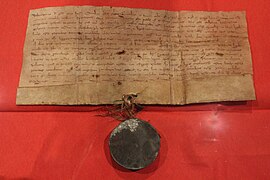

This article does not cite any sources. Please help improve this articlebyadding citations to reliable sources. Unsourced material may be challenged and removed.
Find sources: "Town privileges" – news · newspapers · books · scholar · JSTOR (December 2009) (Learn how and when to remove this message) |


Town privilegesorborough rights were important features of European towns during most of the second millennium. The city law customary in Central Europe probably dates back to Italian models, which in turn were oriented towards the traditions of the self-administrationofRoman cities.
Judicially, a borough (orburgh) was distinguished from the countryside by means of a charter from the ruling monarch that defined its privileges and laws. Common privileges involved trade (marketplace, the storing of goods, etc.) and the establishment of guilds. Some of these privileges were permanent and could imply that the town obtained the right to be called a borough, hence the term "borough rights" (German: Stadtrecht; Dutch: stadsrechten). Some degree of self-government, representation by diet, and tax-relief could also be granted. Multiple tiers existed; for example, in Sweden, the basic royal charter establishing a borough enabled trade, but not foreign trade, which required a higher-tier charter granting staple right.
| National |
|
|---|---|
| Other |
|
This European history–related article is a stub. You can help Wikipedia by expanding it. |
This article relating to the law of Europe or of a European country is a stub. You can help Wikipedia by expanding it. |